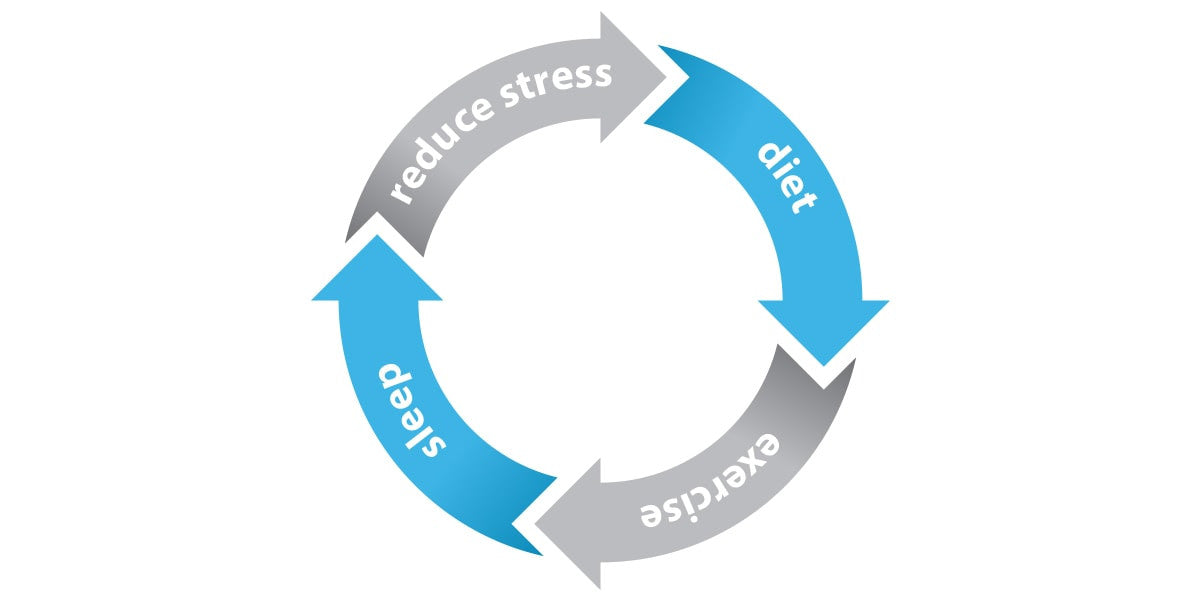800-487-3808
800-487-3808

Are you experiencing weight gain, high blood pressure, or mood swings? If so, your cortisol levels may be high. But what are the ways to lower cortisol, why does it impact the body so negatively, and how can you get back to living the happy healthy life that better suits you?
Allow me to explain ...
To put it simply, cortisol is the hormone produced by the adrenal glands that is released during times of stress. Among other benefits, it helps regulate your metabolism, lower your blood sugar levels, and reduce inflammation.
It is when cortisol levels get too high that problems can occur. Luckily, if your cortisol levels are high, there are plenty of ways you can work to lower your levels.
Working to reduce the level of cortisol in your body and keeping it in check can lead to a healthier and happier life. In addition to reducing the amount of stress you experience on a day-to-day basis, there are four main steps you can take to lower cortisol levels naturally:
Lower cortisol levels and stress have a direct connection. Between the amount of stress you suffer and the levels of cortisol in your body, reducing stress is a given when it comes to reducing cortisol. Using natural stress relievers, such as meditation, deep breathing exercises, and relaxing outdoors can relieve stress, and thus lower cortisol.
Exercise provides one of the best ways to reduce cortisol levels in the body. But be careful not to over-exercise, as this can cause increased levels of cortisol. An exercise routine of 30 minutes a day on most days of the week should provide the exercise you need.
Making sure you get enough sleep helps your body rejuvenate itself and can help in leading a healthier and more stress-free life. When used in conjunction with other natural ways of reducing cortisol, a good sleep schedule can help you reduce the levels of cortisol in your body
An anti-inflammatory diet, such as one high in fiber, antioxidants, and essential nutrients, represents a great way to control the production of cortisol. In addition, a healthy diet has the added benefit of allowing you to better control your weight and blood sugar levels, further reducing cortisol.

For high cortisol levels, supplements are available that might help lower your cortisol levels. The following list includes hormonal therapies, nutrients, and herbal therapies that are reported by health professionals to help lower cortisol levels.
In the body, DHEA is an androgenic hormone akin to testosterone and estrogen that counteracts the effects of cortisol. When the DHEA level is low and the cortisol level high in your body, problems can occur.
Taking a DHEA supplement could bring the ratio of the two hormones back to where they needs to be, helping to relieve the effects of high cortisol.
Melatonin is another hormone that helps regulate cortisol levels in the body. Known for its effects on regulating the sleep cycle, the presence of melatonin in the body results in a reduction in cortisol levels.
Low melatonin levels can thus have an adverse effect, allowing cortisol levels to remain high. Taking melatonin as a supplement might help relieve these high cortisol levels.
Taking a B-complex supplement can also reduce cortisol levels in the body. Extended high levels of cortisol have been shown in clinical trials to decrease the levels of B12. Taking a B-vitamin supplement might lessen the affects of stress, thus lessening the production of cortisol.
While many foods that help reduce cortisol levels contain vitamin C, taking a vitamin C supplement can also have the same effect. Vitamin C is also crucial to maintaining the delicate DHEA/cortisol ratio.
Found primarily in green tea, L-Theanine helps increase relaxation and concentration through the reduction in distraction from anxiety. This increased relaxation can also lead to reduced levels of cortisol in the body.
Studies have shown that ginseng helps reduce stress, including chronic stress, and offers anti-fatigue properties, helping to lower cortisol levels.
Other supplements said to help lower cortisol levels include Omega 3-Fatty Acids (fish oil), probiotics, and adaptogenic herbs.

The ingestion of herbs represents an alternative to controlling cortisol levels in your body. And while the jury is still out on the beneficial effects of the various herbs available, many take herbs for their touted medicinal effects, especially when it comes to controlling cortisol levels.
Listed below are just a few of the adaptogen herbs that are said to reduce cortisol.
Ashwaganda, also called Indian ginseng, is said to help regulate the immune system and reduce anxiety. Anxiety plays a major role in raised stress levels, which in turn leads to more cortisol production.
Said to boost the immune system and help fight the effects of stress, astragalus root originally hails from China. The root is said to work by upping the amount of stress-relieving compounds in the body, in addition to inhibiting some of the effects of cortisol.
Cordycep mushrooms, such as maitake and shitake, contain antioxidant properties. Much like foods with these same properties, cordycep mushrooms are said to help prevent tumors and boost the immune system.
Supporters of using herbs to fight cortisol levels consider ginseng one of the best adaptogen herbs available. The herb provides antioxidant properties and is said to help lower blood sugar and blood pressure.
With supposed anti-aging properties, holy basil is said to help reduce fatigue and stress. Also called tulsi, holy basil is also said to possess the ability to regulate blood pressure, blood sugar, and hormone levels.
While licorice root can affect your blood pressure, the herb is also said to increase energy levels and prolong endurance. Another benefit attributed to the herb is its ability to boost the body’s immune system and help protect the thymus from high cortisol levels.
Containing the potent anxiety-relieving phytochemical salisdroside, rhodiola is said to help fight mental fatigue and reduce the effects of stress. According to recent studies, rhodiola reduces cortisol production in the body while increasing the production of stress-resistant proteins in the body.
Natural ways of reducing cortisol provide a safer alternative to cortisol reduction. But, sometimes, no amount of diet or exercise helps, as is the case with Cushing syndrome, which occurs when your body is subjected to high levels of cortisol for a prolonged length of time.
In instances where natural methods don’t help, your doctor may recommend medication to lower cortisol.
Tip:
Always check with your physician to see what medications, if any, they recommend for cortisol reduction.
Some of the more common medication recommended to treat high levels of cortisol, according to Livestrong.com, include Neuromodulatory Agents, Steroidogenesis Inhibitors, and Cortisol Receptor Antagonists.
Medications such as octreotide, bromocriptine, and cyproheptadine modulate the release of adrenocorticotropic hormone, or ACTH, from the pituitary gland. While these drugs achieve their intended results in different ways, studies have suggested that they effectively reduce cortisol production.
A steroidgenesis inhibitor reduces the production of cortisol by slowing down one or more of the enzymatic steps involved in the cortisol production process. Some of the more common medications used for this include mitotane, cytadren, and ketoconazole, which inhibit cortisol production in different ways.
Drugs, such as mifepristone, bind the glucocorticoid receptors, helping to suppress some of the peripheral features of hypercortisolism. Trial studies have shown that mifepristone is effective in reducing the effects common with high cortisol levels without stopping the production of a body’s natural hormones.
If you want to try lowering cortisol naturally, eating a variety of healthy foods may help you lose weight. Because a high cortisol level has been shown to negatively affect metabolism rates and generate abdominal fat, by eating healthier and lowering your cortisol level, you can lose weight more quickly.

Listed below are some of the best foods that help lower cortisol levels. Try working these nutritious foods into your daily diet.
Asparagus contains folate, a B-vitamin which helps reduce cortisol production in the body by reducing inflammation in your body, returning blood vessels to their normal state, and reduces your body's sensitivity to adrenaline.
Like asparagus, avocados contain folate. In addition, avocados contain glutathione, a substance that keeps the body from absorbing fats that can cause oxidization damage in your body.
Containing high levels of anthocyanin, an antioxidant, berries are also a good source of vitamin C, which has been shown to lower blood pressure, cortisol production, and overall stress in test subjects.
Providing a much-needed source of protein and fat, cashews also provide a source of zinc, which helps fight anxiety and depression, leading causes of stress, which leads to cortisol production.
High in antioxidants, chocolate, especially dark chocolate, can help lower blood pressure and increases your feeling of calm. Chocolate also contains polyphenols and flavonols, antioxidants that help protect your body from free radicals.
While green tea does contain caffeine, it also has L-theanine, an amino acid that counteracts the tendency of caffeine to encourage the body to produce cortisol. Green tea also boosts your mental performance, with brain fog a side effect of high cortisol levels.
A complex carbohydrate, oatmeal promotes the production of serotonin, a chemical that fights stress. Oatmeal also makes you feel fuller, due to the beta-glucan it contains.
High in vitamin C, which helps lower your blood pressure and stress level, oranges make a great, transportable snack.
Plain and simple, oysters are a great source of zinc. Zinc has been shown to reduce anxiety and depression, two of the biggest contributors to high stress.
Containing alpha-linolenic acid, walnuts help fight memory loss and oxidation in the body. Walnuts also contain polyphenols, another antioxidant chemical.
Other suggested foods that lower cortisol levels include garlic, grass-fed beef, and chamomile tea.
Avoid these foods and drinks that increase cortisol:

High cortisol levels sometimes lead to trouble sleeping. Unfortunately, this can create a vicious cycle where the high cortisol levels keep you from sleeping, which further exacerbates the problem by pumping, even more, cortisol into your body.
So, what are some steps you can take before bedtime to reduce stress and lower your cortisol levels, allowing you to get a better night’s sleep?
Start by turning off the TV. Watching TV at bedtime can stimulate your brain, making it harder for you to get to sleep. This is especially true if you try to sleep with the TV on. Read a book instead right before going to bed.
Sleeping with the lights on can also represent problems when trying to sleep. By dimming the lights when you are ready for bed, you give your body the signal that it is time for your pineal gland to secrete melatonin, allowing your body to get a good night’s sleep.
Relaxing music at bedtime helps your mind relax and let go of the stress built up during the day. Studies show that listening to music has an effect on the body and its ability to produce hormones such as cortisol. Music that has between 60 and 80 beats per minute works best.
Taking a hot bath before bed can also help you reduce stress levels. The main effect of a hot bath is to raise your body temperature. The subsequent cooling off after exiting the bath causes a relaxing effect and can lead to better sleep.
Certain essential oils contain compounds, such as linalool and linalyl acetate, that promote relaxation. For best results, diffuse such oils as Lavender and Bergamot in your bedroom at bedtime. You can also use the oils topically, but make sure to use a carrier oil, such as Cassia or Fractioned Coconut Oil to prevent sensitivity responses.
Health issues such as weight gain, high blood pressure, and chronic stress and anxiety can significantly affect the quality of your life. These conditions may be caused by elevated cortisol levels.
The good news is that you can implement some of the tips listed above to reduce cortisol levels in your body, leading to better health and a more stress-free and enjoyable life.
Whether you choose to follow a healthier diet, take medication, or reduce your cortisol levels by more natural methods, make sure to know your options before proceeding. And remember to consult with your physician to help come up with the best solutions for your unique health needs.
Comments
Leave a comment